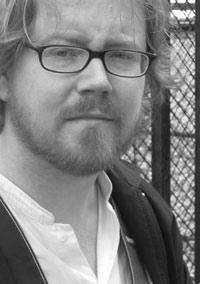 Eyewear is very glad to welcome George Murray to its steadily growing pantheon of superb Friday-featured poets. I first met him in Paris three or more years ago, and we chatted at a sidewalk cafe near my flat, on the corner of Cherche Midi and rue St-Placide, a busy afternoon.
Eyewear is very glad to welcome George Murray to its steadily growing pantheon of superb Friday-featured poets. I first met him in Paris three or more years ago, and we chatted at a sidewalk cafe near my flat, on the corner of Cherche Midi and rue St-Placide, a busy afternoon.I was impressed then with what he had achieved, in terms of writing and publishing, for such a young man. Since then, he's done even more. He was one of the 20 poets in my survey of new Canadian poetry for New American Writing, in 2005.
Murray's books of poetry include The Hunter (McClelland & Stewart, 2003) and The Cottage Builder's Letter (M&S, 2001). His fourth collection is scheduled for publication in spring 2007 with Nightwood Editions.
He has been widely anthologized and has published poems, fiction, and criticism in journals and magazines such as Antigonish Review, Capilano Review, Contemporary Verse, Descant, Fiddlehead, Iowa Review, Jacket, New Quarterly, nthposition, Pequod, Prism International, and Slope. He is also a regular reviewer for several publications, including the Globe and Mail and is the editor of the very successful online lit site, Bookninja.com. See also www.georgemurray.ca
Mostly The World Waits
The vandals here paint with fire, masters
every one. If only that which stands
before us is true, no wonder old men
marshal armies. Mostly the world waits
patiently. Mostly people get on
with things. Mostly they are unaware
of waiting. Mostly they find themselves off
in a desirous space of conscious
hope. Mostly the end arrives and leaves
without notice. The sky is not falling.
It is a suspended canopy,
hung from high-tensile airplane cable rising
into spaces we can only see at night.
Sit still and enjoy the art. Your turn is today.
poem by George Murray
Comments